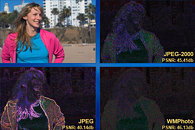zekrahminator
McLovin
- Joined
- Jan 29, 2006
- Messages
- 9,066 (1.31/day)
- Location
- My house.
| Processor | AMD Athlon 64 X2 4800+ Brisbane @ 2.8GHz (224x12.5, 1.425V) |
|---|---|
| Motherboard | Gigabyte sumthin-or-another, it's got an nForce 430 |
| Cooling | Dual 120mm case fans front/rear, Arctic Cooling Freezer 64 Pro, Zalman VF-900 on GPU |
| Memory | 2GB G.Skill DDR2 800 |
| Video Card(s) | Sapphire X850XT @ 580/600 |
| Storage | WD 160 GB SATA hard drive. |
| Display(s) | Hanns G 19" widescreen, 5ms response time, 1440x900 |
| Case | Thermaltake Soprano (black with side window). |
| Audio Device(s) | Soundblaster Live! 24 bit (paired with X-530 speakers). |
| Power Supply | ThermalTake 430W TR2 |
| Software | XP Home SP2, can't wait for Vista SP1. |
Microsoft, back in May, began promoting it's new "Windows Media Photo" standard, which has been since renamed HD Photo. Microsoft is very clear with it's ambitions: They want to replace JPEG as the primary format for pictures. While some would argue that overtaking JPEG as the most popular picture format is a bit overzealous, Microsoft has two figurative ace-in-the-hole's. The first is that Microsoft will be shipping it with Windows Vista. That means that people who use Windows Vista will be able to see HD Photo, regardless of the photo viewer. This isn't exactly the kind of thing you need to switch people to a picture format. So Adobe systems will patch Photoshop CS3 after it is released to support HD Photo. This will allow users to save their pictures in HD Photo. CNET editors call these methods "pervasive", but they could very well be effective. The picture below shows what the difference is between JPEG and HD Photo when talking about compression. The less color in the picture, the less distortion there is, so ideally a perfect compression would be pitch black.

View at TechPowerUp Main Site

View at TechPowerUp Main Site









 .
.

 but use jpeg for internet stuffs cause its just easier
but use jpeg for internet stuffs cause its just easier